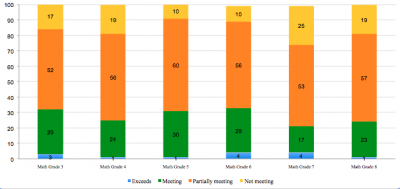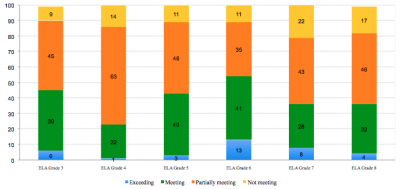MCAS results mixed for Wareham students
The state released the results of the Spring 2019 MCAS tests on September 24, and school officials are pleased.
Dr. Andrea Schwamb, the assistant superintendent for Wareham Schools, said the schools are confident in their knowledge of students’ skills and where changes need to be made, and emphasized that MCAS scores are just the results of one day of testing and aren’t the be-all end-all measure of a student’s abilities.
MCAS is a statewide system of standardized testing. This year, all students took the so-called Next Generation MCAS, which is administered on a computer and has more rigorous standards than the “legacy” paper-based tests. Only the tenth grade science exam was a legacy MCAS test.
Progress was mixed this year, as some grades saw substantial improvement while others lagged behind last year’s students. Overall, Wareham students still lag behind those across the state, with the notable exception of the sixth grade, which beat the state’s percentage of students meeting or exceeding expectations.
Third and sixth graders scored substantially better than last year’s class, as third grade saw 45 percent of students meeting or exceeding expectations in English — 17 percentage points higher than last year. On the math test, with 32 percent of third graders scored in that category this year, up from 24 percent last year. Statewide, 56 percent of third graders meet or exceed standards for English as did 49 percent for math.
Sixth graders were especially strong in English, with 54 percent meeting or exceeding expectations, up from 34 percent last year. On the math exam, 34 percent met or exceeded expectations, which is an increase of 11 percentage points from last year. Statewide, 53 percent of sixth graders met or exceeded expectations in English, as did 52 percent in math.
On the flip side, fourth and fifth graders seemed to struggle in comparison to last year’s cohort, as 16 percent fewer fourth graders met or exceeded expectations in English — only 23 percent of students landed in that category. Twenty-four percent of fourth graders fell into that category for math, down from 42 percent last year. Statewide, 52 percent of fourth graders met or exceeded expectations in English, and 50 percent fell into that category for math. Fifth graders dropped 12 and 7 percent in the meeting or exceeding expectations category for English and math, respectively, with 43 percent of fifth graders in that category for English and 30 percent in that category for math. Statewide, 52 percent of fifth graders fell into that category for English as did 48 percent for math.
“Any time you move kids, no matter what, there’s an effect,” Schwamb said. Third, fourth, and fifth graders were moved to the Middle School and eighth graders were moved to the High School for the 2018-2019 school year due to the closure of Minot Forest Elementary School.
Seventh graders’ scores stayed about the same as last year, with 35 percent meeting or exceeding expectations in English and 21 percent in that category for math. In comparison to 2018, that figure is three percentage points higher in English and two percentage points lower in math. Statewide, 48 percent of seventh graders fell into that category for both English and math.
Eighth graders’ scores dropped slightly this year, as 36 percent met or exceeded expectations in English and 24 percent landed in that category for math. Last year, those numbers were 37 and 31 percent, respectively. Statewide, 52 percent of eighth graders met or exceeded expectations in English and 46 percent met that standard in math.
Because this is the third year the next generation MCAS tests have been administered to some students, Schwamb was able to track the progress of students over time. In 2017, when the test was first administered, 17 percent of third graders did not meet expectations for English Language Arts. In 2019, when those students were in fifth grade, that percentage fell to 11 percent. That group’s gains were even more impressive in math: In third grade, thirty percent did not meet expectations. By fifth grade, only ten percent did not meet expectations.
“Overall, I think that the Middle School did unbelievably well, better than they’ve ever done, and I’m really proud of that work,” Schwamb said. “Minot held their own, which is really impressive.”
Fifth, eighth, and tenth graders take a Science, Technology, and Engineering test in addition to those for English and Math. This year, the younger students took the Next Generation science test, while tenth graders took the older “Legacy” MCAS test on paper. Thirty-eight percent of fifth graders met or exceeded expectations, as did 31 percent of eighth graders. Across the state, 49 percent of fifth graders and 46 percent of eighth graders were in that category. The test the tenth graders took has different score categories, and 43 percent scored advanced or proficient. Across the state, 74 percent scored advanced or proficient.
Because this was the first year tenth graders took the Next Generation MCAS test, which is administered on the computer and has different standards and score categories, it’s not possible to compare their results to last year’s cohort. In English Language Arts, 39 percent of tenth graders met or exceeded expectations. They scored significantly lower than tenth graders across the state, 61 percent of whom met or exceeded expectations, in comparison to Wareham’s 39 percent.
The gap between the achievement of Wareham’s tenth graders to the state overall was similar for the math assessment, as 35 percent of Wareham tenth graders met or exceeded expectations while 59 percent of tenth graders across the state met those targets.
Schwamb said that because this was the first year students took the new test, she doesn’t think the results are concerning. The expectations for students have changed significantly, and so it will take the school time to adapt.
The state also ranks schools and districts on so-called accountability measures. Both Minot Forest and the Middle School were assessed as having made substantial progress towards targets, along with 44 percent of schools in the state. Schwamb pointed out that “substantial progress” is the second-best category in the state’s accountability measure.
Furthermore, none of the schools in the district were flagged as needing assistance from the state. Schwamb said this is the second year that has been the case. In the past, Wareham was consistently deemed to need assistance.
The MCAS results, while important, aren’t the only measure the district has to assess learning, Schwamb said. Teachers and administrators look at student’s MCAS scores in conjunction with other data the district gathers, and use that to determine whether individual students need more help or more challenging work. They also look at data to see if there are patterns that point to areas in the curriculum that need to be re-examined.
For example, for many years MCAS was focused on students’ ability to write non-fiction. When the standards changed, Schwamb said the districts had to tweak curriculums to focus more on writing fictional narratives.
“Some things are going very well, there are some things that need a tweak, but we don’t want to teach to the test,” Schwamb said.
















